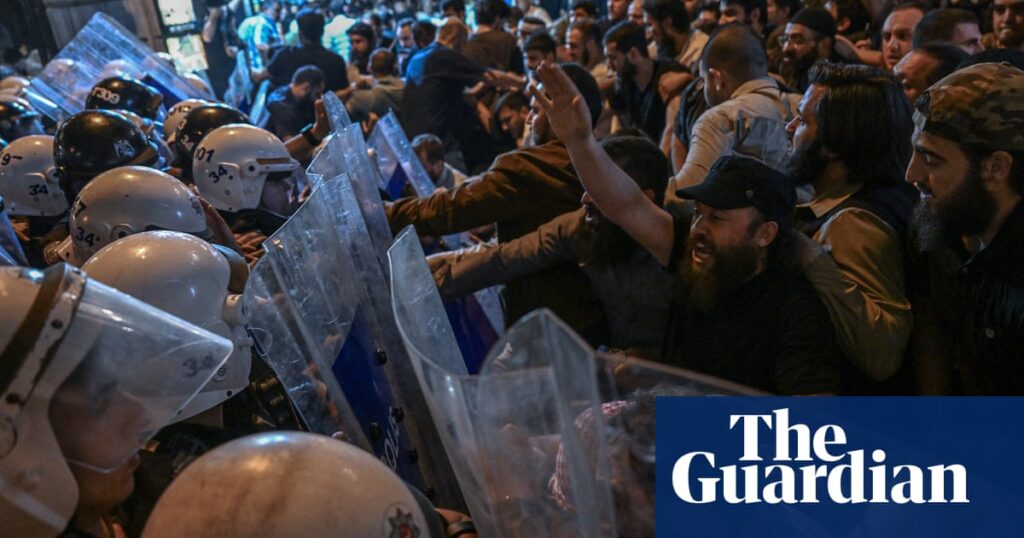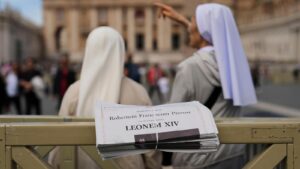
Clashes erupted in Istanbul on Monday as police deployed rubber bullets and teargas to disperse a crowd angered by allegations that a satirical magazine had published a cartoon depicting the prophet Muhammad. The unrest followed an order from Istanbul’s chief prosecutor to arrest editors at LeMan magazine, accused of “publicly insulting religious values” through the controversial image.
Tuncay Akgun, editor-in-chief of LeMan, defended the publication, stating that the cartoon had been misinterpreted. “This cartoon is not a caricature of prophet Muhammad in any way,” Akgun told Agence France-Presse. “In this work, the name of a Muslim who was killed in the bombardments of Israel is fictionalised as Muhammad. More than 200 million people in the Islamic world are named Muhammad. [It] has nothing to do with prophet Muhammad. We would never take such a risk.”
The Protest and Its Aftermath
The initial news of the cartoon led to a mob of angry protesters attacking a bar frequented by LeMan staffers in downtown Istanbul, resulting in scuffles with the police. According to an AFP correspondent, the altercations quickly escalated into larger clashes involving between 250 to 300 people.
Founded in 1991, LeMan is renowned for its political satire and has often been a target of conservative ire, particularly after expressing support for France’s Charlie Hebdo following the 2015 attack by Islamist gunmen on its Paris offices. The attack was a response to Charlie Hebdo’s publication of caricatures of the prophet Muhammad.
Government Response and Arrests
Turkey’s Interior Minister, Ali Yerlikaya, announced on the social media platform X that police had arrested the cartoonist responsible for the image, along with LeMan’s graphic designer. “The person named DP who made this vile drawing has been caught and taken into custody,” Yerlikaya stated. “These shameless individuals will be held accountable before the law.” Reports indicated that the arrest warrant also named LeMan’s editor-in-chief and managing editor.
In a series of posts on X, LeMan defended the cartoon, arguing it was deliberately misinterpreted to incite provocation. “The cartoonist wanted to portray the righteousness of the oppressed Muslim people by depicting a Muslim killed by Israel, he never intended to belittle religious values,” the magazine stated. “We do not accept the stigma imposed on us because there is no depiction of our prophet. It takes a very malicious person to interpret the cartoon in this way.”
Broader Implications and Historical Context
Justice Minister Yilmaz Tunc announced that an investigation had been launched on the grounds of “publicly insulting religious values.” He emphasized, “Disrespect towards our beliefs is never acceptable. No freedom grants the right to make the sacred values of a belief the subject of ugly humour. The caricature or any form of visual representation of our prophet not only harms our religious values but also damages societal peace.”
Istanbul’s governor, Davut Gul, also condemned the magazine’s actions, stating, “We will not remain silent in the face of any vile act targeting our nation’s faith.”
“Disrespect towards our beliefs is never acceptable,” wrote Justice Minister Yilmaz Tunc. “No freedom grants the right to make the sacred values of a belief the subject of ugly humour.”
This incident is reminiscent of past controversies surrounding depictions of the prophet Muhammad, which have often sparked significant backlash in predominantly Muslim countries. The Charlie Hebdo attack in 2015 remains a stark reminder of the potential for violence in such situations. The current situation in Istanbul underscores the ongoing tension between freedom of expression and religious sensitivity, a delicate balance that continues to challenge societies worldwide.
Looking Ahead
As the investigation unfolds, the Turkish government faces the challenge of addressing both domestic and international reactions to the incident. The outcome could have significant implications for freedom of press and expression in Turkey, a nation that has historically grappled with these issues.
The global community will be watching closely as Turkey navigates this complex situation, balancing the need to uphold religious respect with the principles of free expression. The resolution of this incident may set a precedent for how similar cases are handled in the future, both within Turkey and beyond.







